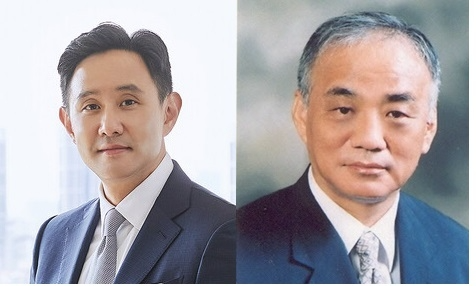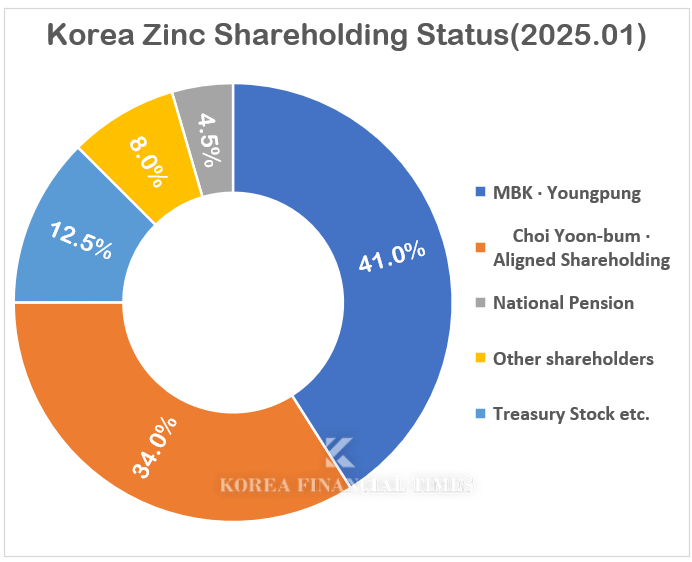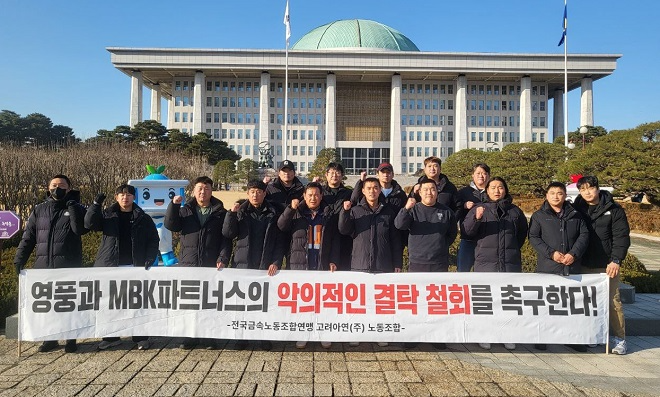 이미지 확대보기
이미지 확대보기MBK-Youngpung holds a 40.97% stake in Korea Zinc. Chairman Choi Yoon-bum and his friend are estimated to hold 34%. MBK-Youngpung is ahead by 6 to 7 percentage points. However, MBK-Youngpung does not have a majority with 46.7 percent of voting shares. It is far from certain that it will be able to pass its agenda. Choi's Aligned Shareholding consists of Hanwha, Hyundai Motor, LG Chem, Trapigura, Morgan Stanley, and Chosun Refractories, all of which are classified as friends. However, it's hard to be sure what position they will take at the actual shareholders' meeting.
 이미지 확대보기
이미지 확대보기In the end, the choice of the National Pension Fund (4.51%) and other shareholders (7.89%) could change things completely. The National Pension Service will hold a specialized committee on fiduciary responsibility today (Jan. 17) to decide how to exercise shareholder rights. The other shareholders are mostly overseas organizations, while some are reportedly domestic. Major proxy advisory firms, which are influential in their choices, have mixed opinions.
To begin with, there are three main issues on the agenda for the extraordinary general meeting of Koryo Zinc: ▲ concentrated voting system, ▲ limitation of the number of directors (19), and ▲ nomination of director candidates.
The concentrated voting system is a method that grants voting rights to the number of directors elected per share when appointing multiple directors. For example, if 10 directors are elected, a shareholder with 10 shares has 100 votes. They can also vote for a single director candidate. Under the same conditions, under the traditional “one share = one vote” system, they would have 10 votes. The existing system favors large shareholders with large stakes.
In the case of Korea Zinc, voting in favor of a concentrated voting system would mean supporting Chairman Choi Yoon-bum, whose shareholding is lagging behind. Moreover, the proposal to introduce the concentrated voting system limits the voting rights of a single shareholder to a maximum of 3%. The analysis favors Choi's side, whose shares are divided among various companies and institutions.
Limiting the number of directors is also a proposal from Choi's side. Currently, the board of directors of Koryo Zinc consists of 12 members. Excluding non-executive director Jang Hyung-jin and advisor Youngpung, the remaining 11 are Choi's people. The 19-member limit would mean seven new directors. This means that MBK-Youngpung will not be able to control the board of directors at this extraordinary general meeting.
MBK-Youngpung has nominated 14 new directors and Choi's camp has nominated seven. There are many variables, including how the vote will be conducted and how many directors will be appointed, depending on whether the concentrated voting system and board limit proposal passes.
ISS sided with MBK and Youngpung on this issue. It opposed the concentrated voting system and voted against all director nominees recommended by the board. Glass Lewis, on the other hand, voted in favor of Choi. It favored the introduction of the concentrated voting system and opposed MBK-Youngpung's nominees. ISS noted that a concentrated voting system for minority shareholders “could have unintended consequences” in the case of Korea Zinc. “The company's financial and operational performance has been quite good compared to its peers, including the leadership of Chairman Choi Yoon-bum,” Glass Lewis said.
With such conflicting opinions, it is difficult to predict the outcome of the extraordinary general meeting of Korea Zinc. Some observers believe that the management dispute will be prolonged.
Even if MBK-Youngpung wins control of the board this time, it is doubtful that the uncertainty caused by the dispute will disappear completely. This is because Korea Zinc employees are actively voicing their support for the current management.
On the 16th, Vice Chairman Lee Jae-joong, Chief Technology Officer of Korea Zinc, and core technical staff issued a statement saying, “We will not stand with MBK-Youngpung if the hostile M&A attempt by MBK-Youngpung is successful.”
The Korea Zinc Workers' Union also announced on the 17th that it recently held a meeting with the Korean Confederation of Trade Unions and the Korean Federation of Metalworkers' Unions to discuss solidarity struggles against the 'hostile M&A'. “If MBK robs Korea Zinc, we will do everything we can to stop it at any cost, including a general strike, to protect our workplace,” said Moon Byung-guk, chairman of the KZIN union.
Gwak Horyung (horr@fntimes.com)
[관련기사]
가장 핫한 경제 소식! 한국금융신문의 ‘추천뉴스’를 받아보세요~
데일리 금융경제뉴스 Copyright ⓒ 한국금융신문 & FNTIMES.com
저작권법에 의거 상업적 목적의 무단 전재, 복사, 배포 금지
















!['Chung Eui-sun Declares Robot Management Era'... Hyundai Motor Group to Lead Robotics Age with 'Physical AI' [KFT Topic]](https://cfnimage.commutil.kr/phpwas/restmb_setimgmake.php?pp=006&w=284&h=214&m=5&simg=20260106111449071567492587736121125197123.jpg&nmt=18)
![Lee Jae-yong and Chey Tae-won, Korea's 'Semiconductor Duo,' Head to China... What's the Status of Local Operations? [KFT Topic]](https://cfnimage.commutil.kr/phpwas/restmb_setimgmake.php?pp=006&w=284&h=214&m=5&simg=2026010608232205705141825007d12411124362.jpg&nmt=18)
!['Beyond Mobile to Robotics': LG Innotek Continues Portfolio Expansion [KFT Topic]](https://cfnimage.commutil.kr/phpwas/restmb_setimgmake.php?pp=006&w=284&h=214&m=5&simg=2026010508201109906141825007d12411124362.jpg&nmt=18)
![Doosan Enerbility Eyes Return to 'A' Credit Rating After 9 Years on Nuclear Power and Gas Turbine Boom [KFT Topic]](https://cfnimage.commutil.kr/phpwas/restmb_setimgmake.php?pp=006&w=284&h=214&m=5&simg=2026010208511504157141825007d12411124362.jpg&nmt=18)


![One Year In: CEO Hyun Shin-kyun Transforms LG CNS into KRW 6 Trillion AI Powerhouse [KFT Topic]](https://cfnimage.commutil.kr/phpwas/restmb_setimgmake.php?pp=006&w=110&h=79&m=5&simg=2026012807381208149141825007d12411124362.jpg&nmt=18)
![Samsung's 'Last Chance': Lee Jae-yong Pushes HBM4 as Make-or-Break Moment [KFT Topic]](https://cfnimage.commutil.kr/phpwas/restmb_setimgmake.php?pp=006&w=110&h=79&m=5&simg=2026012623242806011141825007d122461258.jpg&nmt=18)
![Hyundai Mobis Posts Record Results, Pivots to Robotics and Electrification [KFT Topic]](https://cfnimage.commutil.kr/phpwas/restmb_setimgmake.php?pp=006&w=110&h=79&m=5&simg=2026012911595100522141825007d12411124362.jpg&nmt=18)